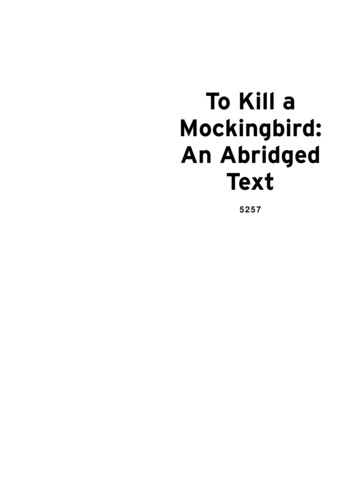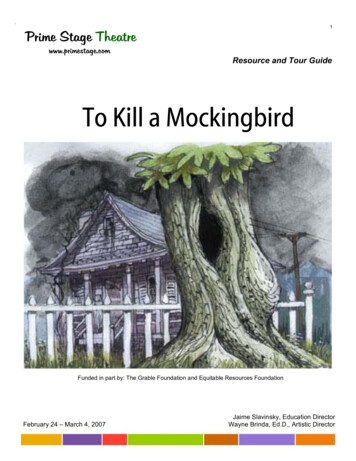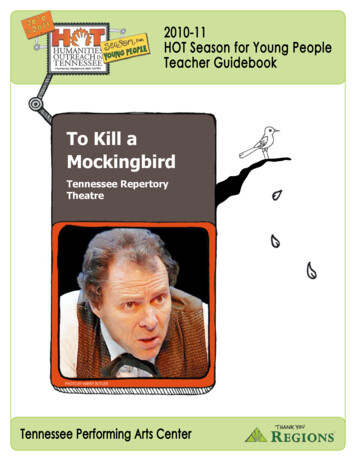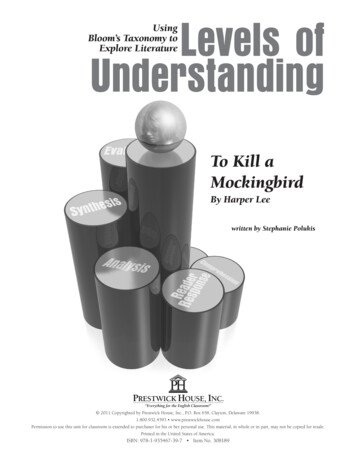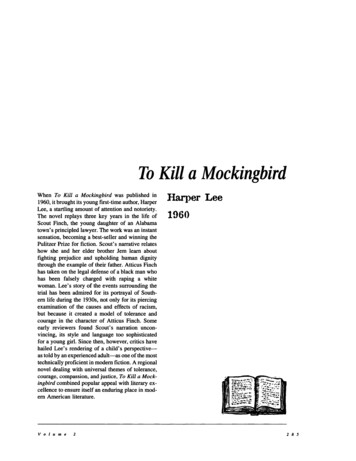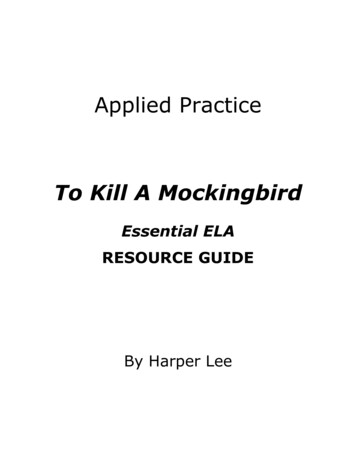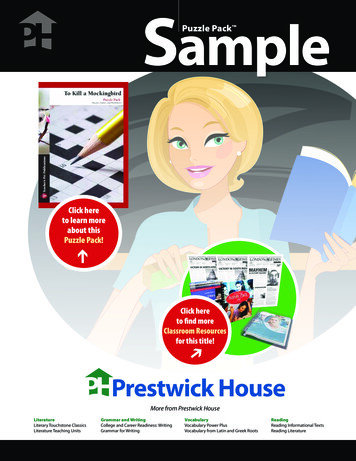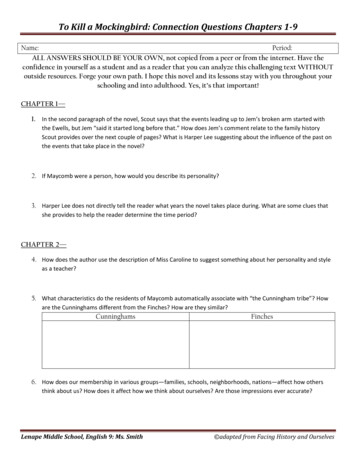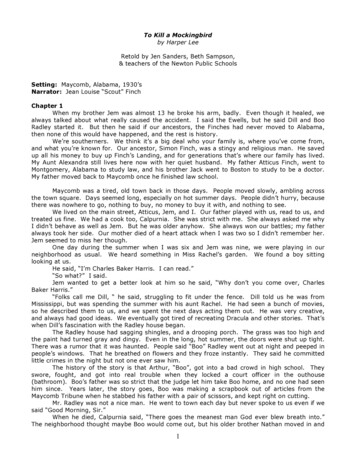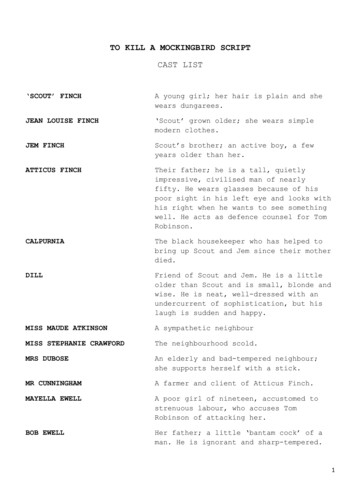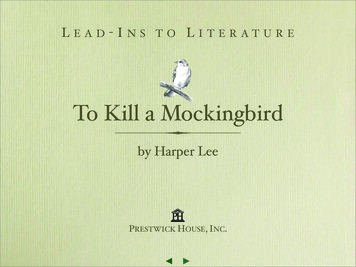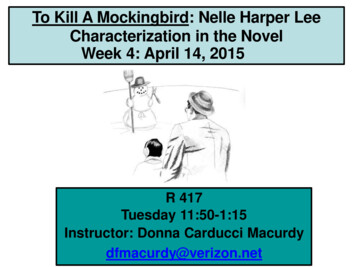
Transcription
To Kill A Mockingbird: Nelle Harper LeeCharacterization in the NovelWeek 4: April 14, 2015R 417Tuesday 11:50-1:15Instructor: Donna Carducci Macurdydfmacurdy@verizon.net
Week 4Agenda1. Announcements: Class Liaison2. Icebreaker: Meaning of Title for Prequel3. Instructor Notes: Chapters 6-104. Literary Techniques: Methods of Characterization– Discursive Method– Dramatic Method– Character Appraisal Method5. Small Group Discussion Chapters 6-106. Viewing: Film To Kill A Mockingbird7. Wrap-Up: Benefits of Reading Literary Fiction vsBenefits of Reading Popular Fiction
“Go Set A WatchmanHarper LeeBiblical Allusion“For thus hath the Lord said unto me,Go, set a watchman, let him declarewhat he seeth."(King James Bible: Book of Isaiah 21:6)
Go Set a Watchman':What does Harper Lee's book title mean?Greg Garrison (Birmingham News/Alabama Media)“Isaiah was a prophet in the Kingdom of Judah, probably between about 740 B.C. and698 B.C. In this verse, he is prophesying about the fall of Babylon. ““Nelle (Harper Lee) probably likened Monroeville to Babylon. The Babylon ofimmoral voices, the hypocrisy. Somebody needs to be set as the watchman to identifywhat we need to do to get out of the mess.“"'Go Set a Watchman' means, 'Somebody needs to be the moral compass of thistown,'". God had set [Isaiah] him as a watchman over Israel.“It's really God speaking to the Hebrews, saying what you need to do is set awatchman, to set you straight, to keep you on the right path. ““Nelle saw her father as being the watchman on the metaphorical gate of Monroeville “Flynt said.“He was a righteous and decent man who took a stand because it was therighteous and morally correct thing to do.“Quoted Text Found in article by Grey Garrison from interview with:Wayne Flynt a longtime friend of Harper Lee and also a Baptist minister
Notes on Chapters 6-10 Chapters 6-10 serve to:– Records the transformation of Boo Radley froman anonymous “malevolent” phantom to a “ benevolent ” phantom“The following week the knot-hole yielded a tarnished medal. Jem showed it toAtticus, who said it was a spelling medal Atticus said someone must have lostit Our biggest prize appeared four days later. It was a pocket watch that wouldn’trun, on a chain with an aluminum knife.” (Chapter 6)– Be a backdrop for further development of gothic elements with theunnatural snowfall, Miss Maudie’s fire and the mad dog incident i.e.,“In front of the Radley gate, Tim Johnson had made up what was left of hismind. He had finally turned himself around, to pursue his original course up ourstreet. He made two steps forward, then stopped and raised his head. We saw hisbody go rigid. With movements so swift they seemed simultaneous Atticus’s handyanked a ball-tipped lever as he brought the gun to his shoulder.”
Notes on Chapters 6-10 Introduce the idea of guilty until proven innocent when– Scout defends Atticus against Francis’ accusation that Atticus is a‘n lover’; without hearing Scout’s side of the story Uncle Jack spanksher.– Atticus tells him later; 'You've a lot to learn, Jack.'– 'I know. Your daughter gave me my first lessons this afternoon. She said Ididn't understand children much and told me why. She was quite right.Atticus, she told me how I should have treated her-oh dear, I'm so sorry Iromped on her.'" Introduce the main symbol is the novel"Atticus said to Jem one day, 'I'd rather you shoot at tin cans inthe back yard, but I know you'll go after birds. Shoot all the bluejays you want, if you can hit 'em, but remember it's a sin to kill amockingbird.'
Methods of CharacterizationUsed by Lee to Create Character1. Discursive Method:In a straightforward manner Scout feeds the readerinformation about a characterExample:Scout tells the reader(Chapter 5):“Miss Maudie hated her house: time spent indoors wastime wasted. She was a widow, a chameleon lady who worked inher flower beds in an old straw hat and men’s coveralls, but afterfive o’clock bath she would appear on the porch and reign overthe street in magisterial beauty”
Methods of CharacterizationCont’d2. Dramatic Method:Characters reveal themselves through actions/wordsExample: Scout asks Atticus: (Chapter 8)“If you shouldn’t be defendin’ him, then why are youdoin’ it?“For a number of reason, said Atticus, “The main one isif I didn’t I couldn’t hold up my head in town, I couldn’trepresent this county in the legislature, I couldn’t eventell you or Jem not to do something again.”
Methods of CharacterizationCont’d3. Character Appraisal Method:Characters comment about another characterExample: Scout’s appraisal: Aunt Alexandra(Chapter 9)“Aunt Alexandra was Atticus’s sister, but when Jem told me aboutchangelings and siblings, I decided that she had been swapped atbirth, that my grandparents had perhaps received a Crawfordinstead of a Finch.Had I ever harbored the mystical notions about mountains thatseem to obsess lawyers and judges, Aunt Alexandra would havebeen analogous to Mount Everest: throughout my life she was coldand there.”
Literary Devices of Characterization1. Specific Detail ( or imagery): 5 types of detail used include:– Actions– Thoughts– Physical Appearance– Events and or– Character’s immediate surroundings2. Authentic Dialogue: Vocabulary, Grammar, and Tone of voice allcreate characters such as:– Scholarly unemotional speeches of Atticus– Emotional taunts of the children– Illiterate bovine testimony of the Ewells3. Juxtaposition Dissimilar characters (foils) are placed side Byside, highlighting differences for the reader; reader is able to cometo their own conclusions minus the judgment of the author.
Literary Foils Characters whose values differ are placed sideby side to make differences more visible:–––––––––Calpurnia/Aunt athan Radley/AtticusScout/MayellaMrs. Dubose/Bob EwellMiss Maudie/Miss StephanieBob Ewell/Tom Robinson
A Final Word About Characterization in TKMJames McBride Interview from: Hey Boo“James McBride, author of the memoir The Color of Water, discusses how Harper Leeused the voice of her protagonists in To Kill a Mockingbird to bravely provide anaccessible and radical point of view about racism in 1960. He describes and how today’sauthors can expand upon Lee’s views.” (American Masters 01/
Benefits of Reading Literary Fiction Research out Thursday [Oct. 3, 2013] finds that reading literary fiction,instead of popular or commercial fiction:1. “Better equips people to sense and understand others’ mental states”2. “May change [the] how, not just [the] what people think about others.” [Theory of the Mind researchers] Emanuele Castano, a psychologyprofessor and David Comer Kidd, a doctoral candidate in socialpsychology at The New York School for Social Research say that [thereason] is:“Due in large part to the fact that literary novelists tend to make readers workharder to understand characters.”“Literary fiction often leaves more to the imagination encouraging readers tomake inferences about characters and be sensitive to emotional nuance andcomplexity.”
Mind Reading SkillsAccording to Castano:“A book like Jane Austen’s Pride and Prejudice orDostoyevsky’s Crime and Punishment gives [the reader]contradictory information.It shows the person behaving in ways that are noteasily interpretable, or at least interpretable in manydifferent ways.By doing so, and not giving [the reader] the wholepicture, the [book and or author] forces [the reader] tocontribute [their] own interpretations, to reconstruct themind of the character.”
Mind Reading SkillsLiterary Fiction vs Popular Fiction Research also suggests that reading literary fiction asks readers to:– “Not only challenge their view of the world but to assume the role of writer, insome cases, filling in gaps and searching for “meanings among a spectrum ofpossible meanings.” In contrast reading popular fiction:– “Often lays out characters in a more complete, straightforward way, leaving littledoubt, for instance, that a hard-boiled detective is a tough guy with a heart ofgold.According to Kidd, one of the researchers, in popular fiction:1.“The author is in control, and the reader has a more passive role;popular fiction seems to be more focused on the plot.”2. “Characters can be interchangeable and usually more stereotypical in theway they are described.” (New York Times)
immoral voices, the hypocrisy. Somebody needs to be set as the watchman to identify what we need to do to get out of the mess." "'Go Set a Watchman' means, 'Somebody needs to be the moral compass of this town,'". God had set [Isaiah] him as a watchman over Israel. "It's really God speaking to the Hebrews, saying what you need to do is set a

